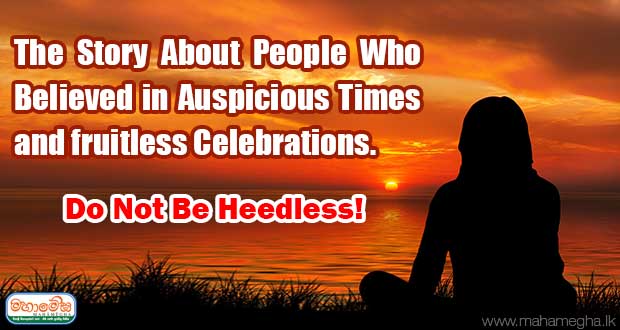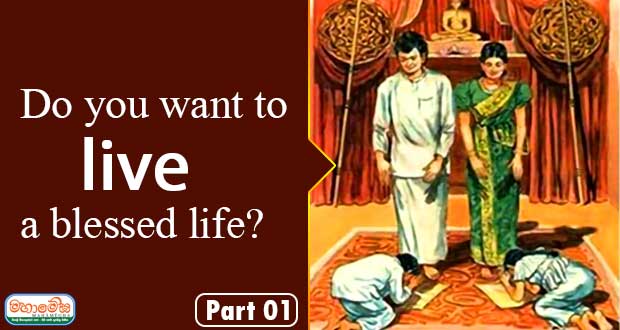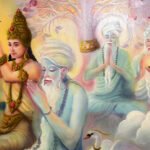Blessed devotees, blessed children, during the time of the Supreme Buddha the city of Savatthi had a population of seven million people. Out of the seven million, five million were followers of the Supreme Buddha. They did not believe in auspicious times, nor did they practice it in their daily lives. They were, instead, believers of meritorious deeds. They believed in good merits such as generosity (Dana), morality (Seela), and mental development (Bhavana). They also tried very hard to practice the thirty-eight points of great protection addressed in the Maha Mangala Sutta.
In Savatti, the population who did not believe in Buddhism and Supreme Buddha were two million. Their beliefs changed often and sought refuge in people and objects as they wished. So this group of people picked certain days of the calendar as their auspicious days that were considered to bring success to their lives. Those special times were picked by the Brahmins. The celebrations for the auspicious times lasted for a week from the day it started. Many people covered themselves in ashes and cow dung during this celebration time. They also splashed others on the street with ashes and cow dung without giving a second thought about their class or status. They made fun of everyone, got together in groups and traveled from house to house. They sang in their front yards and covered each other with ash. All these auspicious activities continued for a week.
These acts of the non-believers became a nuisance to those who believed in Supreme Buddha and his teachings. The believers started to give money to these people and sent them away even before they came near their houses. During that whole week Supreme Buddha and his disciples would not go in alms rounds. The lay devotees brought alms to where Supreme Buddha and his disciples were staying. They offered the food and water to Buddha and to his disciples.
The celebration period ended. The devotees started their day to day affairs in the city again. The devotees of the Supreme Buddha ushered Supreme Buddha and his disciples with great reverence back to the city. They offered food and water to the monks. The city dwellers complained to Supreme Buddha about the nuisance that was created by these non-believers. “Oh my lord, the blessed one, these people have lost their sanity completely by believing in auspicious times. They think that this special time has a lot of supernatural powers. For seven days we had to bear all their craziness. They are not ashamed of their actions. They throw ashes and cow dung at each other. Sometimes they spray each other with cow dung mixed in water. They curse, scream, and make crude jokes at each other. Oh, Supreme Buddha, we can’t even think about those words let alone say them. This whole week, we were stuck inside our houses without being able to go outside. It is a great misfortune that even during the time of the Supreme Buddha, people choose to believe in something so meaningless.”
At that time, Supreme Buddha explained the fruitlessness of those beliefs. The Supreme Buddha also praised the benefits in the belief of cause & effect. The Supreme Buddha explained the virtues of one’s own actions and about one’s ability to decide between the good and the bad actions to the devotees and recited the following two verses.
pamādamanuyuñjanti, bālā dummedhino janā
appamādañca medhāvī, dhanaṃ seṭṭhaṃva rakkhati
Unwise people live like fools in this world
Cherish unwholesome acts living a heedless life
The wise partake in heedfulness
Guard mindfulness all the time as a cherished treasure
mā pamādamanuyuñjetha, mā kāmaratisanthavaṃ
appamatto hi jhāyanto, pappoti vipulaṃ sukhaṃ
Do not engage in negligence like a foolish person does
Do not get caught up and intoxicated in delight and sensuality
Because only those who are heedful and live with mindfulness
Attain profound happiness that leads to nibbana
Dear blessed devotees, blessed children, bālā, and dummedhino are two words in the first stanza. Bālā in the context of the stanza refers to foolish or unwise people not to small children. These people are unable to distinguish between wholesome and unwholesome acts. Dummedhino too refers to unwise persons. Those foolish and unwise people fall prey to all kinds of beliefs. They fail to recognize the exquisite treasures of the triple gem. They do not even make an effort to understand what they are. Therefore, such a person loses the opportunity to make their lives successful. He lacks an aroused effort, fails to guard the sense faculties, neglects wise contemplation and lacks dedication. Alternatively, he chooses to be lazy, lacks being intelligent, does not research, does not study, gets involved in unwholesome acts and meaningless festivities and keeps hoping to prosper. Such people are called heedless people.
The intelligent person does not behave in such a foolish manner. He uses his intelligence to study the dhamma and practices wholesome deeds taught in the dhamma and thereby becomes a heedful person. He cultivates wholesome deeds to his life such as continued effort, dedication, tireless studying, respecting one’s teachers, respecting elders, and associating with noble friends. And guards them like someone guarding a treasure.
Therefore do not waste life being heedless. Do not allow heedlessness to take root in your lives. Ensure that indulging in sensual pleasures is not the aim in your life. Engaging in meritorious deeds is very important to one’s life. The Supreme Buddha had said that people who are heedful and practices the dhamma collect a lot of merits that will eventually help them to reach the supreme bliss.
Appamada Vagga – Scared Verses 6 &7











Thathagatha Arahath Samma Sambudu Rajananwahansege uthum sri saddarmaya nam ekanthayenma satyai.Ea BAGYAWATHUN WAHANSETA MAAGE GAURAWA NAMASKARAYA WEWA!!!